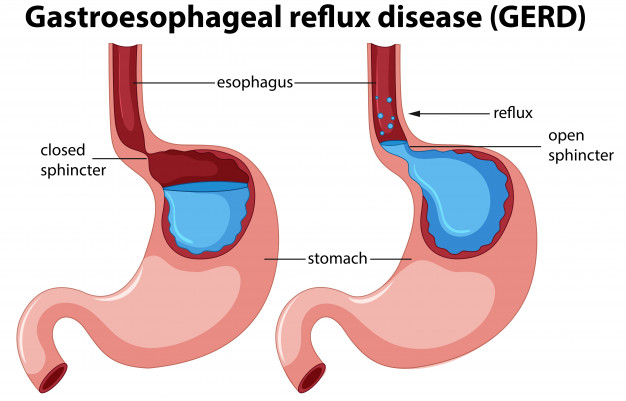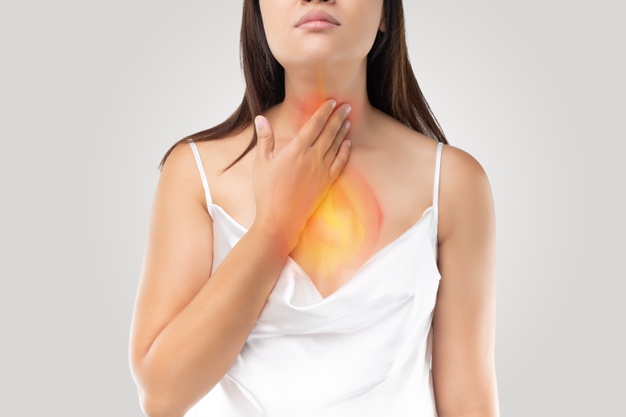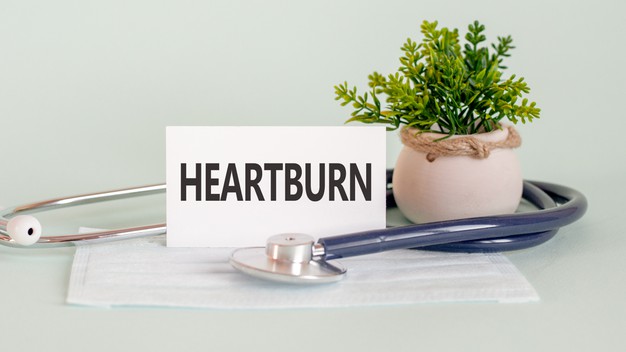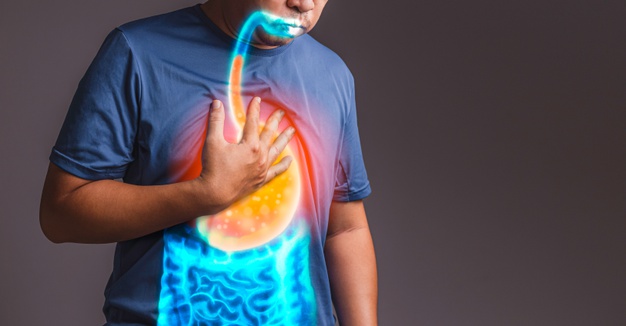Heartburn is a gastrointestinal complication. Generally heartburn has nothing to do with heart, whereas it is considered as a symptom of acid reflux or gastroesophageal reflux disease (GERD). It is occurred when gastric acid or bile flows back into the esophagus and irritates it. It happened when the muscle present at the bottom of the food pipe, also known as lower esophageal sphincter becomes weak. Obes individual as well as pregnant women are more prone to develop this complication as excessive pressure on the abdomen can cause the lower esophageal sphincter to grow slack.

Some time it causes no symptoms but when it happens frequently then it burns the inside of the esophagus and subsequently develops a painful burning feeling within chest and throat. It is also responsible for developing breathing problem, nausea, vomiting, bad breath and difficulty in swallowing.
Below points will discuss about some natural ways for decreasing heartburn as well as acid reflux –
Focus on low carbohydrate diet
- Consumption of low carbohydrate diet plays significant role in improving the symptom
- It has seen that undigested carbohydrate causes bacterial overgrowth and develops excessive pressure within the abdomen, which is considered as one of the leading causes of acid reflux
- The main cause of this bacterial overgrowth is thought to be an impairment in carbohydrate digestion as well as absorption thus it is believed that too much undigested carbohydrate in gastrointestinal system increases the prevalence of flatulence, bloating and acid reflux thus it is better to avoid too much consumption of carbohydrate for preventing this complication

Meal pattern
- It is better to consume smaller meals within a frequent interval as large meals are responsible for putting more pressure on the lower esophageal sphincter, which can ultimately aggravate symptoms
- Try to have lighter meal at dinner and it is better to have the dinner earlier rather than consuming it before bed time for preventing the complication as in this way body gets more time for digestion
Exclusion of foods that trigger complication
Some foods and beverages are accountable for triggering the symptoms thus it is better to exclude all of those foods as well as beverages from diet for decreasing the risk of developing acid reflux and heartburn
Common foods and beverages that trigger the complication include –
- Alcoholic beverages especially red wine
- Black pepper
- Garlic
- Lemon
- Oranges
- Peppermint
- Tomatoes
- Chocolate
- Coffee
- Fatty foods or spicy foods
Posture
- It has seen that posture and activities of an individual after meal, have profound influence on digestion
- It is better to sit up straight for several minutes after meal for preventing heartburn
- On the other hand it is also better to elevate the head while sleeping as it helps to keep the esophagus above the stomach
- Individuals should not engage themselves in any kind of heavy physical activities after a meal as it could contract the abdominal muscle, which can cause the reverse flow of foods from stomach to esophagus and causes heartburn

Weight reduction
- We know that diaphragm is a muscle that present above the stomach and generally it is responsible for strengthening the lower esophageal sphincter. Whereas accumulation of too much belly fat increases the pressure in abdomen that pushed the lower esophageal sphincter upward away from the diaphragm support and this abnormal condition is known as hiatus hernia. Hiatus hernia is considered as one of the most vital factors responsible for making an obes individual more susceptible to develop acid reflux and heartburn
- Losing weight is recognized as most effective remedial action for improving reflux symptoms
- Consumption of high fibre diet with proper physical exercise is extremely beneficial for weight reduction

Limit alcohol consumption
- As mentioned above alcohol can trigger heartburn thus it is better to restrict its consumption
- It has seen that alcohol is responsible for increasing stomach acid secretion and it is also associated with relaxing the lower esophageal sphincter, both of which are accountable for aggravating the symptoms as a result it increases the severity of the complication

Stop smoking
- Smoking has a relation with acid reflux and heartburn
- It has seen that nicotine present in tobacco is responsible for relaxing the lower esophageal sphincter, which allows the flow back of gastric acid from stomach to esophagus and develops the burning sensation thus it is better to avoid smoking
Stop putting excessive pressure on belly
- It has seen that excessive pressure on belly may aggravate the symptoms thus it is better to avoid the wearing of tight clothing
- Individual with heartburn should avoid some physical exercise like sit-ups, stomach crunches, leg lifts etc as these types of activities are accountable for increasing pressure on belly, whereas breathing exercise significantly improves the symptoms of heartburn and acid reflux
Have some ginger
- Consumption of ginger plays significant role in preventing heartburn and it is comparatively more effective for children
- Ginger is loaded with phenolic compounds that play imperative role in decreasing gastric contraction, which ultimately helps to inhibit the flowing back of gastric acid from stomach to esophagus as a result reduces the prevalence of acid reflux
- On the other hand it is also related with providing relief from esophageal irritation thus it is better to include ginger in diet for improving the symptoms

Consume licorice or its supplements
- Consumption of licorice especially deglycyrrhizinated licorice or its supplements is very much effective for preventing heartburn
- It has seen that consumption of deglycyrrhizinated licorice is closely associated with increasing the mucous coating of esophageal lining that ultimately helps the esophagus to resist the irritating effects of gastric acid
Limit the consumption of carbonated beverages
- It is better to restrict the consumption of carbonated beverages as they contain carbon dioxide, which is responsible for increasing the risk of belching as a result it promotes the escaping of gastric acid from stomach to esophagus
- Prolong consumption of carbonated beverages are also associated with weaken the lower esophageal sphincter thus increases the prevalence of acid reflux thus individual with heartburn should avoid the consumption of carbonated soft drinks
Keep away from raw onion
Raw onion contains desirable amount of fermentable fibre, which is responsible for producing more gas as a result it significantly increases the prevalence of acid reflux, heartburn and belching thus it is better to avoid the consumption of too much raw onion
Stop consumption of too much citrus fruits or juice
Individual suffer from acid reflux and heartburn should avoid the consumption of those foods, which contain citric acid as the acidity of citric acid is accountable for making the condition more worsen because it increases the irritation of esophagus

Better to chew gums
- Chewing gums is considered as one of the most effective remedies for preventing heartburn as it is associated with increasing salivation, which ultimately helps to reduce the acidity in esophagus
- It is better to consume those gums, which contain bicarbonate but too much consumption of sweet gum is not wise as it may increase the risk of hyperglycemia
All the above stated ways are extremely effective for managing the symptoms, whereas changing in lifestyle and maintaining a healthy body weight also help to prevent heartburn.

Source:
Clarrett, D.M. and Hachem, C., 2018. Gastroesophageal reflux disease (GERD). Missouri medicine, 115(3), p.214.
Lechien, J.R., Bobin, F., Muls, V., Horoi, M., Thill, M.P., Dequanter, D., Rodriguez, A. and Saussez, S., 2020. Patients with acid, high-fat and low-protein diet have higher laryngopharyngeal reflux episodes at the impedance-pH monitoring. European Archives of Oto-Rhino-Laryngology, 277(2), pp.511-520.
Mehta, R.S., Nguyen, L.H., Ma, W., Staller, K., Song, M. and Chan, A.T., 2021. Association of diet and lifestyle with the risk of gastroesophageal reflux disease symptoms in US women. JAMA Internal Medicine, 181(4), pp.552-554.
Ndebia, E.J., Sammon, A.M., Umapathy, E. and Iputo, J.E., 2017. Diet affects reflux in a rural African community. Acta gastro-enterologica Belgica, 80(3), pp.357-360.
Sethi, S. and Richter, J.E., 2017. Diet and gastroesophageal reflux disease: role in pathogenesis and management. Current opinion in gastroenterology, 33(2), pp.107-111.
Surdea-Blaga, T., Negrutiu, D.E., Palage, M. and Dumitrascu, D.L., 2019. Food and gastroesophageal reflux disease. Current medicinal chemistry, 26(19), pp.3497-3511.



